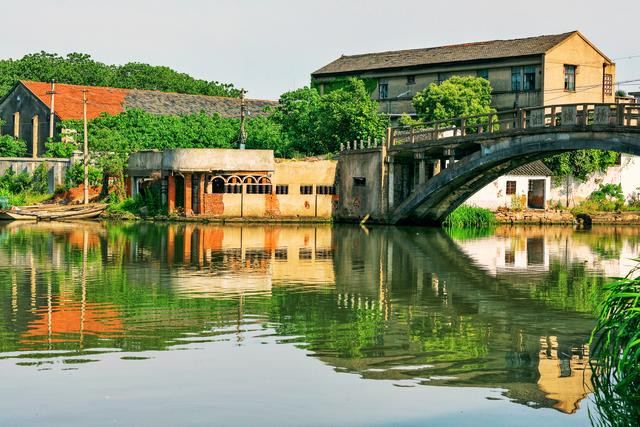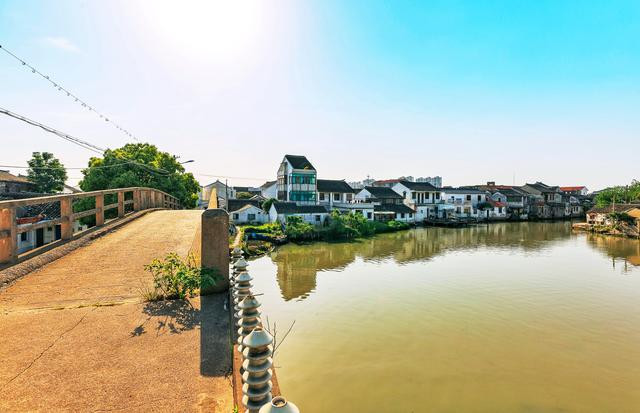Protect our homeland and kill the Japanese invaders. This bloody land is the real Shajiabang
When it comes to Suzhou, most people think of the misty and misty scenery of Jiangnan. As everyone knows, this is also a city of heroes full of blood.
When the war of resistance against Japan burned across the land of China, the sons and daughters of Suzhou, under the leadership of the Communist Party and the New Fourth Army, raised smoke everywhere to protect their homes and kill the Japanese invaders.
Yangcheng Lake is a battlefield where anti-Japanese heroes shed their lives and shed their blood. To this day,"Xiangcheng", which belongs to Yangcheng Lake Town, Xiangcheng District, Suzhou, is still called "Blood Land" by the elderly.



"The morning glow reflects on Yangcheng Lake, and the reed flowers spread the rice and fragrant willows line the banks... I left the battlefield after being injured in battle, and came to Shajiabang after recovering from injuries..." This popular singing originated from the Peking Opera "Shajiabang".
In September 1939, the main force of the "Jiang Anti-Japanese" was ordered to withdraw westward, leaving 36 sick and wounded people scattered in the villages on the bank of Yangcheng Lake to recuperate, and were carefully taken care of by the local villagers.
Based on this story, military writer Cui Zuofu created "Blood-stained Names-A Record of the Struggle of Thirty-Six Sounded and Oyed Patients", which was later adapted into the Shanghai opera "Ludang Fire", and later adapted into the Peking Opera "Shajiabang".
Shajiabang, this sonorous heroic land, has been deeply rooted in the hearts of generations.



As we all know, there is now Shajiabang Town in Changshu City under the jurisdiction of Suzhou. There is also a scenic spot in the town called Shajiabang. Many friends think that the "Shajiabang" in the Peking Opera "is here.
This is a misunderstanding. The place name Shajiabang is actually an artistic refinement of the creator.
During the Japanese Puppet Period, there were two territories in Shajiabang Town: Tangshi Township and Hengjing Township; in September 1958, the original Tangshi Township established the Tangshi People's Commune, and the original Hengjing Township established the Hengjing People's Commune.
In May 1981, Hengjing People's Commune was renamed Ludang People's Commune. On October 9 of the same year, the Revolutionary Committee of the Tang People's Commune was abolished and the Tang People's Commune Management Committee was established; the Revolutionary Committee of the Ludang People's Commune was abolished and the Ludang People's Commune Management Committee was established.
In July 1983, the Tang People's Commune was abolished and Tangshi Township was established; the Ludang People's Commune was abolished and Ludang Township was established. In April 1986, Tangshi Township was abolished and Tangshi Town was established. In March 1992, Ludang Township was abolished and Shajiabang Town was established.
In June 2003, Shajiabang Town and Tang Town were merged into Shajiabang Town. In August 2013, Shajiabang Resort and Shajiabang Town implemented a "district and town integration" management system.



It can be seen that today's Shajiabang is not a real existence in the Peking Opera "Shajiabang", but is "expanded" for the development of tourism.
So, where is the real Shajiabang?
Since the place name "Yangcheng Lake" was sung in the Peking Opera "Shajiabang", it is necessary to trace the origin from history.
According to the three summary tables of "Yangcheng Lake Area Party Organization","Yangcheng Lake Area Political Power Organization" and "Yangcheng Lake Area·Local Armed System" in "A Brief History of the Revolutionary Struggle in Wu County", the Yangcheng Lake area is an anti-Japanese guerrilla zone behind enemy lines, and the areas it contains include the lakeshore towns such as Yujing, Xiangcheng, Taiping, Lumu and Industrial Park in Xiangcheng District, as well as Weitang, Nanqiao and other townships on the west bank of the lake.



According to historical records, the 36 wounded and sick people in the prototype of "Shajiabang" were left in the Yangcheng Lake area in 1939 when "Jiang Kang" voluntarily evacuated to avoid expanding friction with the Kuomintang.
The "Stories Collection of the New Fourth Army" organized and compiled by leading comrades within the army such as Wang Hao, who once participated in the New Fourth Army and former deputy director of the Literary and Art Theory Research Department and director of the Culture and Sports Department of the Ministry of Culture of the General Political Department, stated,"In order to avoid the expansion of friction and strive for unity and resistance against Japan, the 'Jiang Kang' voluntarily moved to Luxi, leaving only a rear hospital located on the bank of Yangcheng Lake and 36 sick and wounded people left in Ludong. It is said to be a 'rear hospital', but in fact it is neither a rear nor a' hospital'. 36 sick and wounded are scattered in Hengchuan, Xinjing, Luxiang, Xiaojing, Changbang, Zhangjiabang, Xidongjiabang and other villages on the bank of Yangcheng Lake..."



It can be concluded that the above-mentioned place name is the prototype of "Shajiabang" in the Peking Opera "Shajiabang". At present, except for "Xidongjiabang", which has not yet been verified, all place names are natural villages under the jurisdiction of Yangcheng Lake Town, Xiangcheng District.
General Huang Feng, who was the director of the Political Department of the Air Force of the Fuzhou Military Region, was one of the 36 wounded and wounded at that time. In an exclusive interview with him in the 11th issue of "Chinese Elderly" magazine in 1955, when answering whether Grandma Sha and Aunt Aqing were really people, General Huang replied: At that time, our party had many underground traffic officers in Suchang area, many of whom opened teahouses and wine shops as cover. The Shajiabang in the play was actually Zhangjiabang.
It is necessary to note that Zhangjiabang is now a natural village under the jurisdiction of Yangcheng Lake Town, Xiangcheng District.
On December 12, 1940, the "Xinjiang Anti-Japanese Anti-
These "three major bloody battles" all occurred in the current Yangcheng Lake Town.



I wrote this article not for the dispute between "true and false Shajiabang". It is meaningless. "Shajiabang" belongs to all Chinese people and carries the suffering and indomitable spirit of struggle of the Chinese nation.
But history cannot be forgotten!
Only by remembering history can we not forget our original aspirations. Only by being loyal to history can future generations remember this hot land under our feet. It is the unyielding backbone of our ancestors and a stepping stone to the great rejuvenation of the Chinese nation.



Previous Article:Explore the source of crabs, which is better to eat hairy crabs in Yangcheng Lake, and visit Bacheng on the bank of Yangcheng Lake
Next Article:Situ Temple, the retreat of Deng Yu in the Eastern Han Dynasty
